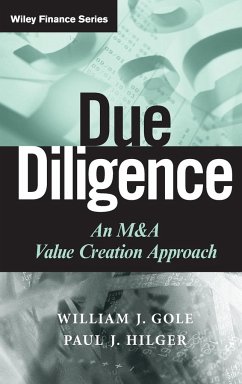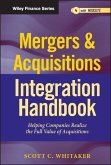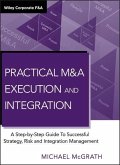- Gebundenes Buch
- Merkliste
- Auf die Merkliste
- Bewerten Bewerten
- Teilen
- Produkt teilen
- Produkterinnerung
- Produkterinnerung
This nuts and bolts guide examines all aspects of an M&A due diligence from coming to the decision to acquire a company, to who should be on the due diligence team, to the actual process and the final report and post closing follow up. It advocates a focus on both risk mitigation and shareholder value creation, and emphasizes a holistic approach that spans from planning to post acquisition integration. The tentative contents is: (1) Introduction; (2) Planning for value creation: growth strategy; (3) Engagement and pursuit; (4) Preparing for due diligence; (5) Validation of value: performing…mehr
Andere Kunden interessierten sich auch für
![Mergers & Acquisitions Integration Handbook, + Website Mergers & Acquisitions Integration Handbook, + Website]() Scott C. WhitakerMergers & Acquisitions Integration Handbook, + Website82,99 €
Scott C. WhitakerMergers & Acquisitions Integration Handbook, + Website82,99 €![Corporate Divestitures Corporate Divestitures]() William J. GoleCorporate Divestitures135,99 €
William J. GoleCorporate Divestitures135,99 €![Mergers and Acquisitions Mergers and Acquisitions]() Steven M. BraggMergers and Acquisitions61,99 €
Steven M. BraggMergers and Acquisitions61,99 €![Mergers and Acquisitions Deal-Makers Mergers and Acquisitions Deal-Makers]() Michael E. S. FrankelMergers and Acquisitions Deal-Makers44,99 €
Michael E. S. FrankelMergers and Acquisitions Deal-Makers44,99 €![Mergers, Acquisitions, Divestitures, and Other Restructurings, + Website Mergers, Acquisitions, Divestitures, and Other Restructurings, + Website]() Paul PignataroMergers, Acquisitions, Divestitures, and Other Restructurings, + Website91,99 €
Paul PignataroMergers, Acquisitions, Divestitures, and Other Restructurings, + Website91,99 €![M&A Information Technology Best Practices M&A Information Technology Best Practices]() Janice M. Roehl-AndersonM&A Information Technology Best Practices81,99 €
Janice M. Roehl-AndersonM&A Information Technology Best Practices81,99 €![Practical M&A Execution and Integration Practical M&A Execution and Integration]() Michael R McGrathPractical M&A Execution and Integration72,99 €
Michael R McGrathPractical M&A Execution and Integration72,99 €-
-
-
This nuts and bolts guide examines all aspects of an M&A due diligence from coming to the decision to acquire a company, to who should be on the due diligence team, to the actual process and the final report and post closing follow up. It advocates a focus on both risk mitigation and shareholder value creation, and emphasizes a holistic approach that spans from planning to post acquisition integration. The tentative contents is: (1) Introduction; (2) Planning for value creation: growth strategy; (3) Engagement and pursuit; (4) Preparing for due diligence; (5) Validation of value: performing due diligence; (6) Assessment of due diligence results; (7) Optimizing value: post diligence negotiation; (8) Extracting value: post transaction integration.
Hinweis: Dieser Artikel kann nur an eine deutsche Lieferadresse ausgeliefert werden.
Hinweis: Dieser Artikel kann nur an eine deutsche Lieferadresse ausgeliefert werden.
Produktdetails
- Produktdetails
- Wiley Finance
- Verlag: Wiley & Sons
- Artikelnr. des Verlages: 14537590000
- 1. Auflage
- Seitenzahl: 304
- Erscheinungstermin: 1. August 2009
- Englisch
- Abmessung: 235mm x 157mm x 21mm
- Gewicht: 502g
- ISBN-13: 9780470375907
- ISBN-10: 0470375906
- Artikelnr.: 25621574
- Herstellerkennzeichnung
- Libri GmbH
- Europaallee 1
- 36244 Bad Hersfeld
- gpsr@libri.de
- Wiley Finance
- Verlag: Wiley & Sons
- Artikelnr. des Verlages: 14537590000
- 1. Auflage
- Seitenzahl: 304
- Erscheinungstermin: 1. August 2009
- Englisch
- Abmessung: 235mm x 157mm x 21mm
- Gewicht: 502g
- ISBN-13: 9780470375907
- ISBN-10: 0470375906
- Artikelnr.: 25621574
- Herstellerkennzeichnung
- Libri GmbH
- Europaallee 1
- 36244 Bad Hersfeld
- gpsr@libri.de
WILLIAM J. GOLE, MBA, CPA, is the former Senior Vice President, Planning and Business Development, with Thomson Healthcare, a division of Thomson Reuters, where he was responsible for strategic planning and acquisition and divestiture activity. PAUL J. HILGER, CPA, is the former Executive Vice President and Chief Financial Officer of Thomson Healthcare. He has over twenty-five years of financial leadership experience, and has led numerous acquisitions and divestitures from planning through integration.
Preface xiii
Step-by-Step Guidance xiii
Organization xiv
Planning xv
Investigation xvi
Execution xvii
About the Authors xix
Part One Planning 1
Chapter 1 Introduction 3
Overview 3
Mergers and Acquisitions: A Way of Corporate Life 3
Mixed Results 6
Acquisition Risk and Due Diligence 7
Preventable Causes of Failure 10
Myopic Approach to Due Diligence 11
Reacting to Deals 11
Compartmentalized Behavior 13
Inactionable Findings 13
Exclusive Focus on Risk Mitigation 14
Key Success Factors 14
Holistic View of Due Diligence 14
Growth Strategy 15
Integrated Management 15
Purposeful Action 16
Value Orientation 16
Due Diligence and Value Creation 16
Plan to Create Value 16
Strategic Purpose 17
Value Drivers 20
Key Risks 23
Purposeful Behavior 24
Key Points 25
Chapter 2 Planning for Value Creation: Growth Strategy 27
Introduction 27
Central Role of Strategic Planning 27
Chapter Focus 28
The Strategic Planning Process 29
Managing the Process 30
Characteristics of an Effective Planning Process 31
Process Overview 32
Strategic Assessment 32
Market Targeting Process 33
Investment Objectives 34
Market Expansion 35
Vertical Integration 37
Infrastructure Improvement 38
Investment Alternatives 38
Characteristics of Investment Types 39
Backup Planning 45
Plan Outputs 46
Conclusion 51
Key Points 51
Chapter 3 Implementing the Growth Strategy 53
From Identification to Pursuit 53
Choosing an Acquisition Strategy 53
Winnowing Process 54
Identification 58
Marketplace for Acquisitions 58
Identifying Prospects 59
Qualification 64
Strategic Fit 64
Availability 66
Engagement 67
Proactive Engagement 68
Role of Management versus Intermediaries 70
Confidentiality of Information: Nondisclosure Agreement (NDA) 70
Reactive Engagement 71
Assessment 73
Notification/Approval Document 73
Plan to Create Value 76
Pursuit 78
Transaction Framework: Sellers' and Acquirers' Different Perspectives 79
Taking Action: Assembling the Core Acquisition Team 81
Key Points 83
Part Two Investigation 85
Chapter 4 Preparing for Due Diligence 87
Introduction 87
Due Diligence Reviews 88
Chapter Focus 89
Environmental Factors 90
External Constraints of the Sale Process 90
Internal Limitations of the Acquirer 92
Nature of the Target Company 92
Impact of Environmental Factors on the Review 93
Creation of the Due Diligence Team 93
Introduction 93
Composition of the Due Diligence Team 94
A Caveat 97
Other Considerations 97
Initial Preparation Measures 98
Development of the Due Diligence Program 99
Program Development Process 99
Key Aspects of the Due Diligence Program 100
Objectives, Procedures and Findings, and Recommendations Illustrated 103
A Due Diligence Mind-Set 105
Planning Due Diligence 106
Finalize the Program 106
Mechanisms for Team Coordination 107
Resolve Issues of Overlap 107
Maintain an Aggressive Posture 107
Communicate Logistical Information 108
Communicate Responsibility and Timing of Report Submissions 108
Key Points 108
Appendix 4A: Due Diligence Checklist 109
I. Review Company Background and Organization and Proposed Transaction 109
II. Financial 112
III. Technology 114
IV. Products 115
V. Marketing and Sales 116
VI. Legal 116
VII. Insurance 119
VIII. Human Resources 119
Chapter 5 Conducting the Due Diligence Review 125
Introduction 125
Overview of Transaction Types 125
Auctions 126
Auctions: The Buyer's Perspective 127
Preemptive Bids 128
Purchase Premium Preemption 129
Price Preemption: The Buyer's Perspective 129
Relationship-Based Preemption 130
Relationship-Based Preemption: The Buyer's Perspective 130
Summary of Transaction Characteristics 131
Components of the Due Diligence Review 131
Management Presentations 132
Management Team Interviews 134
Document Review 135
Tour of the Facilities 136
Technology Trade-Offs 137
Due Diligence Reviews: An Objectives-Driven Approach 138
Overview 138
Due Diligence Objectives 139
Integration 140
Assessment by Function 141
Finance and Accounting 142
Human Resources 145
Sales and Marketing 148
Research and Development 150
Information Technology Review 151
Operations/Production Review 152
Legal and Insurance Review 153
Cross-Functional Coordination and Analysis 154
Conclusion 159
Key Points 159
Appendix 5A: Illustrative Final Process Letter Outline 160
Invitation 160
Description of Transaction Process 160
Guidelines for Final Offers 161
Appendix 5B: Illustrative Data Room Information Listing 161
Chapter 6 Reporting on Due Diligence: Deliverables and Decisions 165
Introduction 165
Outcomes of the Due Diligence Review 165
The Importance of Backup Planning 166
Elimination in the Auction Process 167
Outputs/Reports 168
The No-Go Decision 170
No-Go Discoveries 171
Strategic Issues 171
Valuation Issues 172
Risk Issues 173
Outputs/Reports 175
Renegotiations of Major Terms 175
Outputs/Reports 178
Decision to Proceed 179
Outputs/Reports 179
Comprehensive Due Diligence Report 180
Summary Due Diligence Report 180
Corporate Approval Document 182
Integration Plan 186
Contingency Plan 188
Key Points 188
Part Three Execution 191
Chapter 7 Optimizing Value: Translating Due Diligence Findings into Action
193
Acting on Due Diligence Findings 193
Preacquisition vs. Postacquisition Issues 193
Revisiting the Valuation and Purchase Price 195
Reviewing the Acquisition Transaction Structure 199
Contingent Purchase Price 199
Acquiring Assets vs. Stock 200
Sharing Risk: Contractual Terms and Conditions 202
Marking Up the Draft Purchase Agreement 202
Contract Drafting and Revision 202
Key Sections of the Purchase Agreement 203
Purchase and Sale 203
Closing 205
Representations and Warranties of the Seller 206
Representations and Warranties of the Buyer 208
Covenants 208
Employment Matters 209
Conditions to Close 210
Termination 211
Indemnification 211
Tax Matters 212
General Provisions 212
Disclosure Schedules 213
Transition Services Agreement 213
Managing Contract Negotiations 215
Effective and Efficient Negotiations 215
Empowered Leadership 215
Support of Legal Counsel 216
Support by Experts 217
Review and Feedback 218
Commitment to Getting the Deal Done 220
Closing 220
Shepherding the Transaction toward Closing 220
Regulatory Approval 221
Hart-Scott-Rodino (HSR) Act 221
Buyer Financing 224
Third-Party Consents 224
Closing the Transaction 224
Key Points 225
Chapter 8 Integration: Extracting Value and Mitigating Risk 227
Dual Focus of the Integration Effort 227
Extracting Value 228
Mitigating Risk 229
Integration Team 231
Early Formation 231
Leadership 232
Structure and Composition 233
Integration Plan 234
Plan Components 234
First 90 Days vs. Longer Term 238
Management of the Integration Process 239
Communication 239
Reporting and Decision Making 242
Contingency Plan 245
Broader View of Risks 245
Plan Components 245
Human Factors 247
Culture 247
Knowledge Transfer 249
Recommendations for Postacquisition Management 250
Key Points 251
Appendix What is the Premerger Notification Program: An Overview 253
Index 275
Step-by-Step Guidance xiii
Organization xiv
Planning xv
Investigation xvi
Execution xvii
About the Authors xix
Part One Planning 1
Chapter 1 Introduction 3
Overview 3
Mergers and Acquisitions: A Way of Corporate Life 3
Mixed Results 6
Acquisition Risk and Due Diligence 7
Preventable Causes of Failure 10
Myopic Approach to Due Diligence 11
Reacting to Deals 11
Compartmentalized Behavior 13
Inactionable Findings 13
Exclusive Focus on Risk Mitigation 14
Key Success Factors 14
Holistic View of Due Diligence 14
Growth Strategy 15
Integrated Management 15
Purposeful Action 16
Value Orientation 16
Due Diligence and Value Creation 16
Plan to Create Value 16
Strategic Purpose 17
Value Drivers 20
Key Risks 23
Purposeful Behavior 24
Key Points 25
Chapter 2 Planning for Value Creation: Growth Strategy 27
Introduction 27
Central Role of Strategic Planning 27
Chapter Focus 28
The Strategic Planning Process 29
Managing the Process 30
Characteristics of an Effective Planning Process 31
Process Overview 32
Strategic Assessment 32
Market Targeting Process 33
Investment Objectives 34
Market Expansion 35
Vertical Integration 37
Infrastructure Improvement 38
Investment Alternatives 38
Characteristics of Investment Types 39
Backup Planning 45
Plan Outputs 46
Conclusion 51
Key Points 51
Chapter 3 Implementing the Growth Strategy 53
From Identification to Pursuit 53
Choosing an Acquisition Strategy 53
Winnowing Process 54
Identification 58
Marketplace for Acquisitions 58
Identifying Prospects 59
Qualification 64
Strategic Fit 64
Availability 66
Engagement 67
Proactive Engagement 68
Role of Management versus Intermediaries 70
Confidentiality of Information: Nondisclosure Agreement (NDA) 70
Reactive Engagement 71
Assessment 73
Notification/Approval Document 73
Plan to Create Value 76
Pursuit 78
Transaction Framework: Sellers' and Acquirers' Different Perspectives 79
Taking Action: Assembling the Core Acquisition Team 81
Key Points 83
Part Two Investigation 85
Chapter 4 Preparing for Due Diligence 87
Introduction 87
Due Diligence Reviews 88
Chapter Focus 89
Environmental Factors 90
External Constraints of the Sale Process 90
Internal Limitations of the Acquirer 92
Nature of the Target Company 92
Impact of Environmental Factors on the Review 93
Creation of the Due Diligence Team 93
Introduction 93
Composition of the Due Diligence Team 94
A Caveat 97
Other Considerations 97
Initial Preparation Measures 98
Development of the Due Diligence Program 99
Program Development Process 99
Key Aspects of the Due Diligence Program 100
Objectives, Procedures and Findings, and Recommendations Illustrated 103
A Due Diligence Mind-Set 105
Planning Due Diligence 106
Finalize the Program 106
Mechanisms for Team Coordination 107
Resolve Issues of Overlap 107
Maintain an Aggressive Posture 107
Communicate Logistical Information 108
Communicate Responsibility and Timing of Report Submissions 108
Key Points 108
Appendix 4A: Due Diligence Checklist 109
I. Review Company Background and Organization and Proposed Transaction 109
II. Financial 112
III. Technology 114
IV. Products 115
V. Marketing and Sales 116
VI. Legal 116
VII. Insurance 119
VIII. Human Resources 119
Chapter 5 Conducting the Due Diligence Review 125
Introduction 125
Overview of Transaction Types 125
Auctions 126
Auctions: The Buyer's Perspective 127
Preemptive Bids 128
Purchase Premium Preemption 129
Price Preemption: The Buyer's Perspective 129
Relationship-Based Preemption 130
Relationship-Based Preemption: The Buyer's Perspective 130
Summary of Transaction Characteristics 131
Components of the Due Diligence Review 131
Management Presentations 132
Management Team Interviews 134
Document Review 135
Tour of the Facilities 136
Technology Trade-Offs 137
Due Diligence Reviews: An Objectives-Driven Approach 138
Overview 138
Due Diligence Objectives 139
Integration 140
Assessment by Function 141
Finance and Accounting 142
Human Resources 145
Sales and Marketing 148
Research and Development 150
Information Technology Review 151
Operations/Production Review 152
Legal and Insurance Review 153
Cross-Functional Coordination and Analysis 154
Conclusion 159
Key Points 159
Appendix 5A: Illustrative Final Process Letter Outline 160
Invitation 160
Description of Transaction Process 160
Guidelines for Final Offers 161
Appendix 5B: Illustrative Data Room Information Listing 161
Chapter 6 Reporting on Due Diligence: Deliverables and Decisions 165
Introduction 165
Outcomes of the Due Diligence Review 165
The Importance of Backup Planning 166
Elimination in the Auction Process 167
Outputs/Reports 168
The No-Go Decision 170
No-Go Discoveries 171
Strategic Issues 171
Valuation Issues 172
Risk Issues 173
Outputs/Reports 175
Renegotiations of Major Terms 175
Outputs/Reports 178
Decision to Proceed 179
Outputs/Reports 179
Comprehensive Due Diligence Report 180
Summary Due Diligence Report 180
Corporate Approval Document 182
Integration Plan 186
Contingency Plan 188
Key Points 188
Part Three Execution 191
Chapter 7 Optimizing Value: Translating Due Diligence Findings into Action
193
Acting on Due Diligence Findings 193
Preacquisition vs. Postacquisition Issues 193
Revisiting the Valuation and Purchase Price 195
Reviewing the Acquisition Transaction Structure 199
Contingent Purchase Price 199
Acquiring Assets vs. Stock 200
Sharing Risk: Contractual Terms and Conditions 202
Marking Up the Draft Purchase Agreement 202
Contract Drafting and Revision 202
Key Sections of the Purchase Agreement 203
Purchase and Sale 203
Closing 205
Representations and Warranties of the Seller 206
Representations and Warranties of the Buyer 208
Covenants 208
Employment Matters 209
Conditions to Close 210
Termination 211
Indemnification 211
Tax Matters 212
General Provisions 212
Disclosure Schedules 213
Transition Services Agreement 213
Managing Contract Negotiations 215
Effective and Efficient Negotiations 215
Empowered Leadership 215
Support of Legal Counsel 216
Support by Experts 217
Review and Feedback 218
Commitment to Getting the Deal Done 220
Closing 220
Shepherding the Transaction toward Closing 220
Regulatory Approval 221
Hart-Scott-Rodino (HSR) Act 221
Buyer Financing 224
Third-Party Consents 224
Closing the Transaction 224
Key Points 225
Chapter 8 Integration: Extracting Value and Mitigating Risk 227
Dual Focus of the Integration Effort 227
Extracting Value 228
Mitigating Risk 229
Integration Team 231
Early Formation 231
Leadership 232
Structure and Composition 233
Integration Plan 234
Plan Components 234
First 90 Days vs. Longer Term 238
Management of the Integration Process 239
Communication 239
Reporting and Decision Making 242
Contingency Plan 245
Broader View of Risks 245
Plan Components 245
Human Factors 247
Culture 247
Knowledge Transfer 249
Recommendations for Postacquisition Management 250
Key Points 251
Appendix What is the Premerger Notification Program: An Overview 253
Index 275
Preface xiii
Step-by-Step Guidance xiii
Organization xiv
Planning xv
Investigation xvi
Execution xvii
About the Authors xix
Part One Planning 1
Chapter 1 Introduction 3
Overview 3
Mergers and Acquisitions: A Way of Corporate Life 3
Mixed Results 6
Acquisition Risk and Due Diligence 7
Preventable Causes of Failure 10
Myopic Approach to Due Diligence 11
Reacting to Deals 11
Compartmentalized Behavior 13
Inactionable Findings 13
Exclusive Focus on Risk Mitigation 14
Key Success Factors 14
Holistic View of Due Diligence 14
Growth Strategy 15
Integrated Management 15
Purposeful Action 16
Value Orientation 16
Due Diligence and Value Creation 16
Plan to Create Value 16
Strategic Purpose 17
Value Drivers 20
Key Risks 23
Purposeful Behavior 24
Key Points 25
Chapter 2 Planning for Value Creation: Growth Strategy 27
Introduction 27
Central Role of Strategic Planning 27
Chapter Focus 28
The Strategic Planning Process 29
Managing the Process 30
Characteristics of an Effective Planning Process 31
Process Overview 32
Strategic Assessment 32
Market Targeting Process 33
Investment Objectives 34
Market Expansion 35
Vertical Integration 37
Infrastructure Improvement 38
Investment Alternatives 38
Characteristics of Investment Types 39
Backup Planning 45
Plan Outputs 46
Conclusion 51
Key Points 51
Chapter 3 Implementing the Growth Strategy 53
From Identification to Pursuit 53
Choosing an Acquisition Strategy 53
Winnowing Process 54
Identification 58
Marketplace for Acquisitions 58
Identifying Prospects 59
Qualification 64
Strategic Fit 64
Availability 66
Engagement 67
Proactive Engagement 68
Role of Management versus Intermediaries 70
Confidentiality of Information: Nondisclosure Agreement (NDA) 70
Reactive Engagement 71
Assessment 73
Notification/Approval Document 73
Plan to Create Value 76
Pursuit 78
Transaction Framework: Sellers' and Acquirers' Different Perspectives 79
Taking Action: Assembling the Core Acquisition Team 81
Key Points 83
Part Two Investigation 85
Chapter 4 Preparing for Due Diligence 87
Introduction 87
Due Diligence Reviews 88
Chapter Focus 89
Environmental Factors 90
External Constraints of the Sale Process 90
Internal Limitations of the Acquirer 92
Nature of the Target Company 92
Impact of Environmental Factors on the Review 93
Creation of the Due Diligence Team 93
Introduction 93
Composition of the Due Diligence Team 94
A Caveat 97
Other Considerations 97
Initial Preparation Measures 98
Development of the Due Diligence Program 99
Program Development Process 99
Key Aspects of the Due Diligence Program 100
Objectives, Procedures and Findings, and Recommendations Illustrated 103
A Due Diligence Mind-Set 105
Planning Due Diligence 106
Finalize the Program 106
Mechanisms for Team Coordination 107
Resolve Issues of Overlap 107
Maintain an Aggressive Posture 107
Communicate Logistical Information 108
Communicate Responsibility and Timing of Report Submissions 108
Key Points 108
Appendix 4A: Due Diligence Checklist 109
I. Review Company Background and Organization and Proposed Transaction 109
II. Financial 112
III. Technology 114
IV. Products 115
V. Marketing and Sales 116
VI. Legal 116
VII. Insurance 119
VIII. Human Resources 119
Chapter 5 Conducting the Due Diligence Review 125
Introduction 125
Overview of Transaction Types 125
Auctions 126
Auctions: The Buyer's Perspective 127
Preemptive Bids 128
Purchase Premium Preemption 129
Price Preemption: The Buyer's Perspective 129
Relationship-Based Preemption 130
Relationship-Based Preemption: The Buyer's Perspective 130
Summary of Transaction Characteristics 131
Components of the Due Diligence Review 131
Management Presentations 132
Management Team Interviews 134
Document Review 135
Tour of the Facilities 136
Technology Trade-Offs 137
Due Diligence Reviews: An Objectives-Driven Approach 138
Overview 138
Due Diligence Objectives 139
Integration 140
Assessment by Function 141
Finance and Accounting 142
Human Resources 145
Sales and Marketing 148
Research and Development 150
Information Technology Review 151
Operations/Production Review 152
Legal and Insurance Review 153
Cross-Functional Coordination and Analysis 154
Conclusion 159
Key Points 159
Appendix 5A: Illustrative Final Process Letter Outline 160
Invitation 160
Description of Transaction Process 160
Guidelines for Final Offers 161
Appendix 5B: Illustrative Data Room Information Listing 161
Chapter 6 Reporting on Due Diligence: Deliverables and Decisions 165
Introduction 165
Outcomes of the Due Diligence Review 165
The Importance of Backup Planning 166
Elimination in the Auction Process 167
Outputs/Reports 168
The No-Go Decision 170
No-Go Discoveries 171
Strategic Issues 171
Valuation Issues 172
Risk Issues 173
Outputs/Reports 175
Renegotiations of Major Terms 175
Outputs/Reports 178
Decision to Proceed 179
Outputs/Reports 179
Comprehensive Due Diligence Report 180
Summary Due Diligence Report 180
Corporate Approval Document 182
Integration Plan 186
Contingency Plan 188
Key Points 188
Part Three Execution 191
Chapter 7 Optimizing Value: Translating Due Diligence Findings into Action
193
Acting on Due Diligence Findings 193
Preacquisition vs. Postacquisition Issues 193
Revisiting the Valuation and Purchase Price 195
Reviewing the Acquisition Transaction Structure 199
Contingent Purchase Price 199
Acquiring Assets vs. Stock 200
Sharing Risk: Contractual Terms and Conditions 202
Marking Up the Draft Purchase Agreement 202
Contract Drafting and Revision 202
Key Sections of the Purchase Agreement 203
Purchase and Sale 203
Closing 205
Representations and Warranties of the Seller 206
Representations and Warranties of the Buyer 208
Covenants 208
Employment Matters 209
Conditions to Close 210
Termination 211
Indemnification 211
Tax Matters 212
General Provisions 212
Disclosure Schedules 213
Transition Services Agreement 213
Managing Contract Negotiations 215
Effective and Efficient Negotiations 215
Empowered Leadership 215
Support of Legal Counsel 216
Support by Experts 217
Review and Feedback 218
Commitment to Getting the Deal Done 220
Closing 220
Shepherding the Transaction toward Closing 220
Regulatory Approval 221
Hart-Scott-Rodino (HSR) Act 221
Buyer Financing 224
Third-Party Consents 224
Closing the Transaction 224
Key Points 225
Chapter 8 Integration: Extracting Value and Mitigating Risk 227
Dual Focus of the Integration Effort 227
Extracting Value 228
Mitigating Risk 229
Integration Team 231
Early Formation 231
Leadership 232
Structure and Composition 233
Integration Plan 234
Plan Components 234
First 90 Days vs. Longer Term 238
Management of the Integration Process 239
Communication 239
Reporting and Decision Making 242
Contingency Plan 245
Broader View of Risks 245
Plan Components 245
Human Factors 247
Culture 247
Knowledge Transfer 249
Recommendations for Postacquisition Management 250
Key Points 251
Appendix What is the Premerger Notification Program: An Overview 253
Index 275
Step-by-Step Guidance xiii
Organization xiv
Planning xv
Investigation xvi
Execution xvii
About the Authors xix
Part One Planning 1
Chapter 1 Introduction 3
Overview 3
Mergers and Acquisitions: A Way of Corporate Life 3
Mixed Results 6
Acquisition Risk and Due Diligence 7
Preventable Causes of Failure 10
Myopic Approach to Due Diligence 11
Reacting to Deals 11
Compartmentalized Behavior 13
Inactionable Findings 13
Exclusive Focus on Risk Mitigation 14
Key Success Factors 14
Holistic View of Due Diligence 14
Growth Strategy 15
Integrated Management 15
Purposeful Action 16
Value Orientation 16
Due Diligence and Value Creation 16
Plan to Create Value 16
Strategic Purpose 17
Value Drivers 20
Key Risks 23
Purposeful Behavior 24
Key Points 25
Chapter 2 Planning for Value Creation: Growth Strategy 27
Introduction 27
Central Role of Strategic Planning 27
Chapter Focus 28
The Strategic Planning Process 29
Managing the Process 30
Characteristics of an Effective Planning Process 31
Process Overview 32
Strategic Assessment 32
Market Targeting Process 33
Investment Objectives 34
Market Expansion 35
Vertical Integration 37
Infrastructure Improvement 38
Investment Alternatives 38
Characteristics of Investment Types 39
Backup Planning 45
Plan Outputs 46
Conclusion 51
Key Points 51
Chapter 3 Implementing the Growth Strategy 53
From Identification to Pursuit 53
Choosing an Acquisition Strategy 53
Winnowing Process 54
Identification 58
Marketplace for Acquisitions 58
Identifying Prospects 59
Qualification 64
Strategic Fit 64
Availability 66
Engagement 67
Proactive Engagement 68
Role of Management versus Intermediaries 70
Confidentiality of Information: Nondisclosure Agreement (NDA) 70
Reactive Engagement 71
Assessment 73
Notification/Approval Document 73
Plan to Create Value 76
Pursuit 78
Transaction Framework: Sellers' and Acquirers' Different Perspectives 79
Taking Action: Assembling the Core Acquisition Team 81
Key Points 83
Part Two Investigation 85
Chapter 4 Preparing for Due Diligence 87
Introduction 87
Due Diligence Reviews 88
Chapter Focus 89
Environmental Factors 90
External Constraints of the Sale Process 90
Internal Limitations of the Acquirer 92
Nature of the Target Company 92
Impact of Environmental Factors on the Review 93
Creation of the Due Diligence Team 93
Introduction 93
Composition of the Due Diligence Team 94
A Caveat 97
Other Considerations 97
Initial Preparation Measures 98
Development of the Due Diligence Program 99
Program Development Process 99
Key Aspects of the Due Diligence Program 100
Objectives, Procedures and Findings, and Recommendations Illustrated 103
A Due Diligence Mind-Set 105
Planning Due Diligence 106
Finalize the Program 106
Mechanisms for Team Coordination 107
Resolve Issues of Overlap 107
Maintain an Aggressive Posture 107
Communicate Logistical Information 108
Communicate Responsibility and Timing of Report Submissions 108
Key Points 108
Appendix 4A: Due Diligence Checklist 109
I. Review Company Background and Organization and Proposed Transaction 109
II. Financial 112
III. Technology 114
IV. Products 115
V. Marketing and Sales 116
VI. Legal 116
VII. Insurance 119
VIII. Human Resources 119
Chapter 5 Conducting the Due Diligence Review 125
Introduction 125
Overview of Transaction Types 125
Auctions 126
Auctions: The Buyer's Perspective 127
Preemptive Bids 128
Purchase Premium Preemption 129
Price Preemption: The Buyer's Perspective 129
Relationship-Based Preemption 130
Relationship-Based Preemption: The Buyer's Perspective 130
Summary of Transaction Characteristics 131
Components of the Due Diligence Review 131
Management Presentations 132
Management Team Interviews 134
Document Review 135
Tour of the Facilities 136
Technology Trade-Offs 137
Due Diligence Reviews: An Objectives-Driven Approach 138
Overview 138
Due Diligence Objectives 139
Integration 140
Assessment by Function 141
Finance and Accounting 142
Human Resources 145
Sales and Marketing 148
Research and Development 150
Information Technology Review 151
Operations/Production Review 152
Legal and Insurance Review 153
Cross-Functional Coordination and Analysis 154
Conclusion 159
Key Points 159
Appendix 5A: Illustrative Final Process Letter Outline 160
Invitation 160
Description of Transaction Process 160
Guidelines for Final Offers 161
Appendix 5B: Illustrative Data Room Information Listing 161
Chapter 6 Reporting on Due Diligence: Deliverables and Decisions 165
Introduction 165
Outcomes of the Due Diligence Review 165
The Importance of Backup Planning 166
Elimination in the Auction Process 167
Outputs/Reports 168
The No-Go Decision 170
No-Go Discoveries 171
Strategic Issues 171
Valuation Issues 172
Risk Issues 173
Outputs/Reports 175
Renegotiations of Major Terms 175
Outputs/Reports 178
Decision to Proceed 179
Outputs/Reports 179
Comprehensive Due Diligence Report 180
Summary Due Diligence Report 180
Corporate Approval Document 182
Integration Plan 186
Contingency Plan 188
Key Points 188
Part Three Execution 191
Chapter 7 Optimizing Value: Translating Due Diligence Findings into Action
193
Acting on Due Diligence Findings 193
Preacquisition vs. Postacquisition Issues 193
Revisiting the Valuation and Purchase Price 195
Reviewing the Acquisition Transaction Structure 199
Contingent Purchase Price 199
Acquiring Assets vs. Stock 200
Sharing Risk: Contractual Terms and Conditions 202
Marking Up the Draft Purchase Agreement 202
Contract Drafting and Revision 202
Key Sections of the Purchase Agreement 203
Purchase and Sale 203
Closing 205
Representations and Warranties of the Seller 206
Representations and Warranties of the Buyer 208
Covenants 208
Employment Matters 209
Conditions to Close 210
Termination 211
Indemnification 211
Tax Matters 212
General Provisions 212
Disclosure Schedules 213
Transition Services Agreement 213
Managing Contract Negotiations 215
Effective and Efficient Negotiations 215
Empowered Leadership 215
Support of Legal Counsel 216
Support by Experts 217
Review and Feedback 218
Commitment to Getting the Deal Done 220
Closing 220
Shepherding the Transaction toward Closing 220
Regulatory Approval 221
Hart-Scott-Rodino (HSR) Act 221
Buyer Financing 224
Third-Party Consents 224
Closing the Transaction 224
Key Points 225
Chapter 8 Integration: Extracting Value and Mitigating Risk 227
Dual Focus of the Integration Effort 227
Extracting Value 228
Mitigating Risk 229
Integration Team 231
Early Formation 231
Leadership 232
Structure and Composition 233
Integration Plan 234
Plan Components 234
First 90 Days vs. Longer Term 238
Management of the Integration Process 239
Communication 239
Reporting and Decision Making 242
Contingency Plan 245
Broader View of Risks 245
Plan Components 245
Human Factors 247
Culture 247
Knowledge Transfer 249
Recommendations for Postacquisition Management 250
Key Points 251
Appendix What is the Premerger Notification Program: An Overview 253
Index 275








